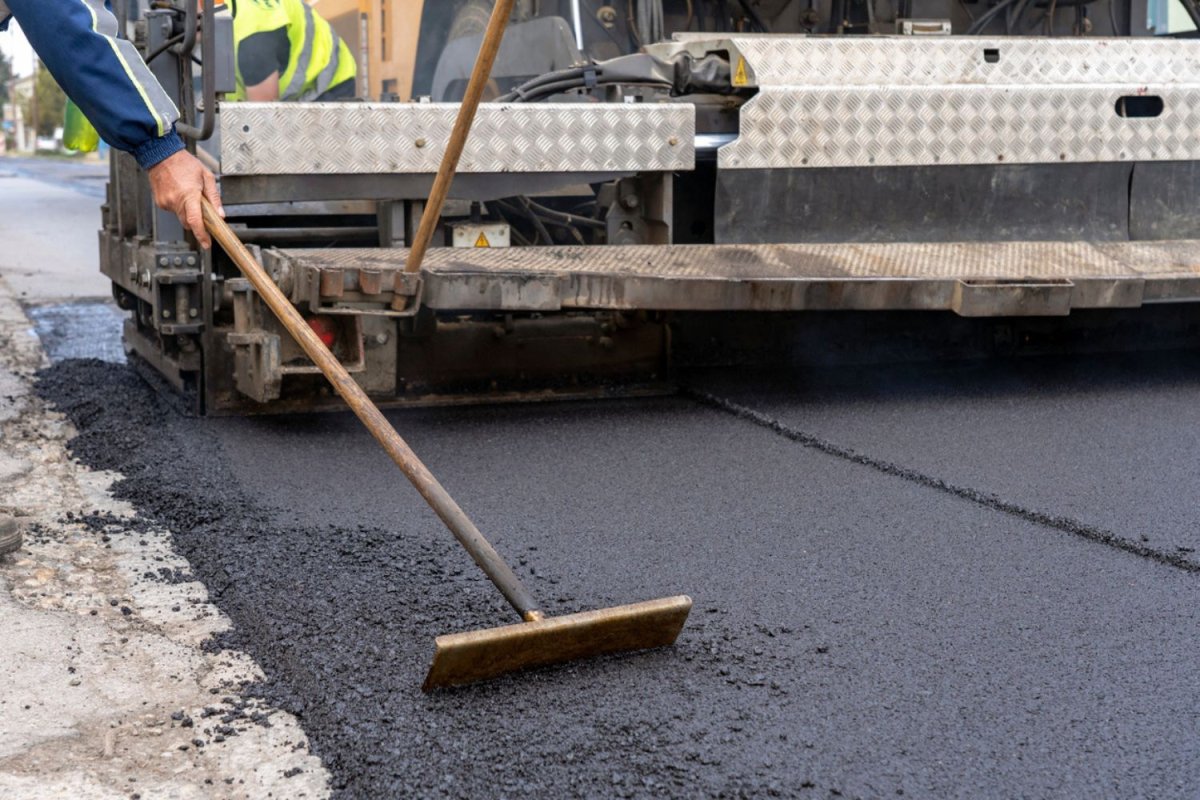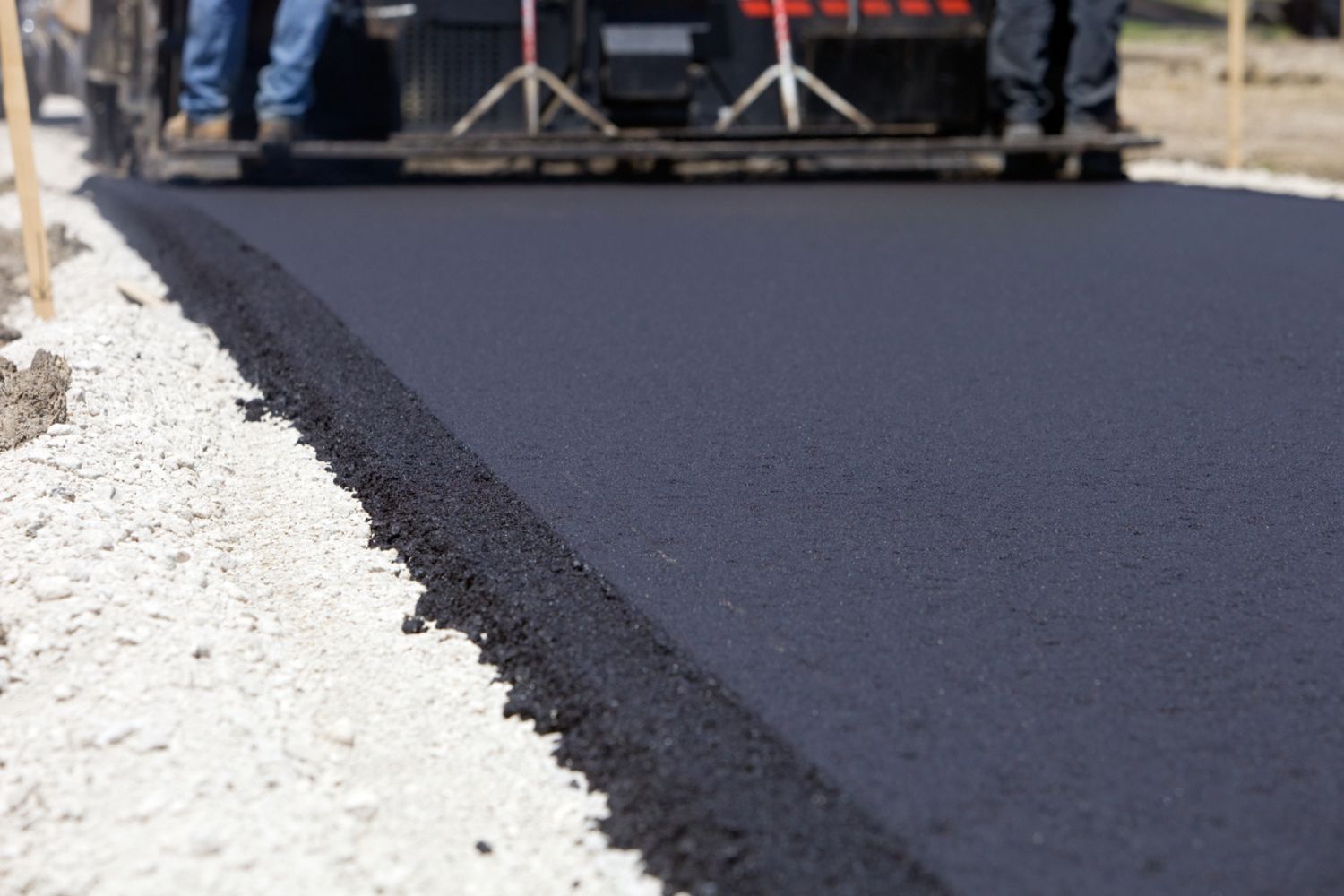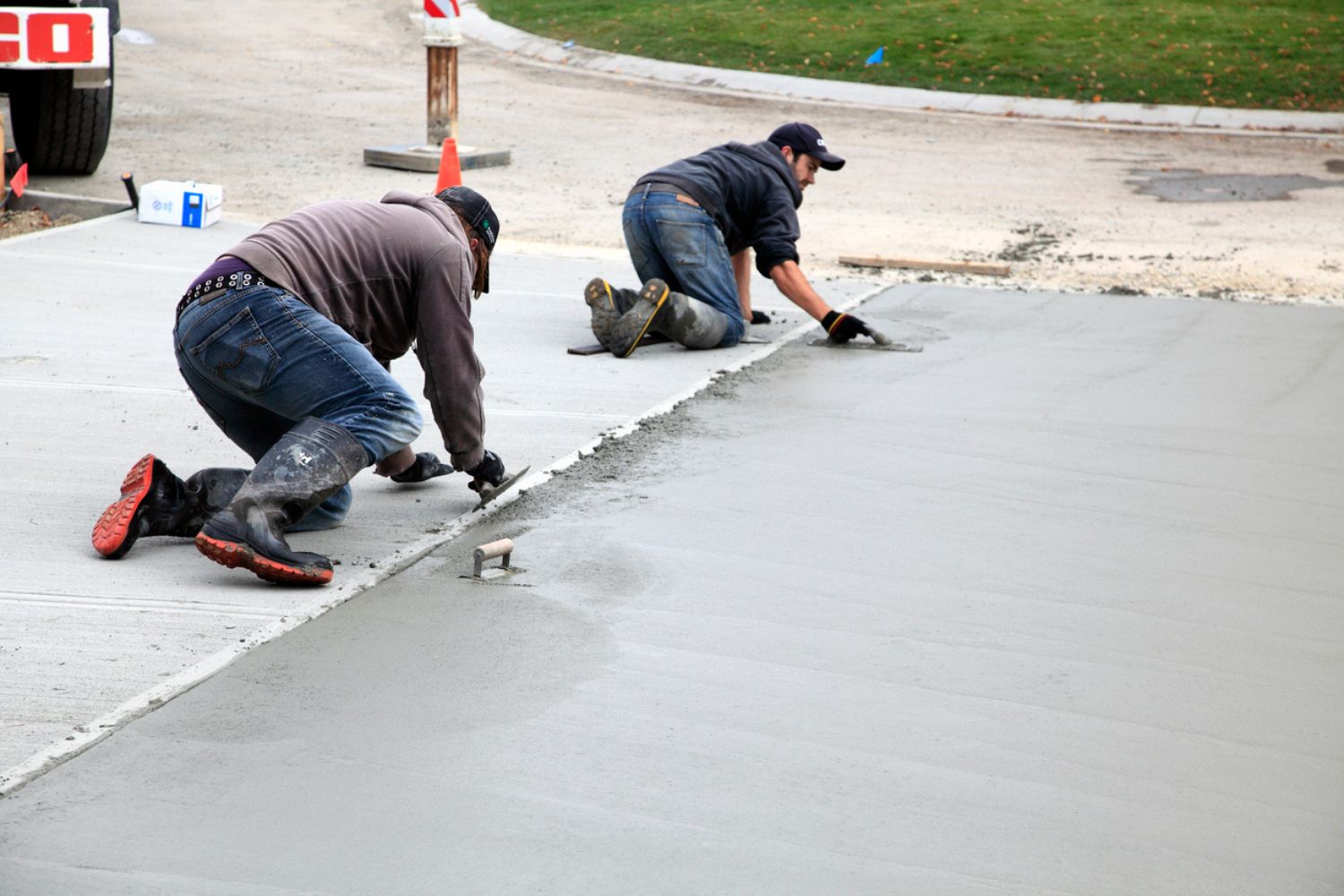

We may earn revenue from the products available on this page and participate in affiliate programs. Learn More ›
What You Need to Know
While both asphalt and concrete driveways offer a durable surface, each has its own benefits, characteristics, aesthetics, maintenance requirements, and price. When deciding on which type of material to use for a driveway, homeowners will want to examine the pros and cons of each material and what will work the best for their needs while considering the local climate and weather conditions. What’s the difference between asphalt driveway costs vs. concrete driveway costs? Asphalt driveways cost from $5 to $15 per square foot, depending on how many inches of asphalt are needed, and a concrete driveway runs from $8 to $18 per square foot. While concrete has higher up-front costs, it requires less regular maintenance than asphalt, so homeowners can expect to spend less money on maintenance costs. A concrete surface is also more durable than asphalt and can last twice as long. For those who live in cold northern climates, asphalt is typically the better driveway surface material since it can withstand freeze-thaw cycles much better than concrete. Another aspect for homeowners to consider when choosing driveway material is that asphalt is a byproduct of the crude oil refining process, so when oil prices fluctuate, so does the price of asphalt. Which type of driveway material is the best? Below is a comparison of each material.
- Asphalt. Asphalt is a mixture of stone dust, small stones, and sand that’s mixed with bitumen. Bitumen is the liquid binder that’s used for parking lots, driveways, and road construction, and it’s also used as an insulating, waterproofing, and sealing agent. Typically derived from crude oil, bitumen is a black liquid that is responsible for the dark surface of an asphalt driveway, although with recent advancements in technology, some specialized finishes and stains are available to tint the asphalt layer. Asphalt is a porous material that can absorb water but it also has excellent flexibility, which makes it the driveway material of choice for those who live in cold climates. The ability to withstand freeze-thaw cycles makes this material beneficial in a colder climate, but it can also become sticky and soft in hot weather and the material can transfer to the bottoms of shoes. Asphalt may not be the best choice of driveway material in hotter climates since it absorbs heat and can injure those who touch it with unprotected feet or hands. Asphalt driveway costs are typically more budget-friendly than those of concrete, but the material needs to be sealed 6 to 12 months after installation, and the constant maintenance of resurfacing and resealing it every 3 to 5 years can can cause costs to quickly add up.
- Concrete. Concrete is also made of crushed stone, sand, and gravel, but the binding agent is a cement paste, which is made from a mixture of cement and water. When dried, the gravel base aggregate and cement concrete form an extremely durable surface that can last longer than asphalt—even under heavy traffic conditions. It takes approximately 7 days for concrete to cure, so homeowners will want to consider this when deciding on driveway materials. While this versatile material does cost more upfront, it requires minimal maintenance tasks, which makes this material more cost-effective in the long run. Since concrete isn’t as flexible as asphalt, it is prone to cracking in freezing temperatures, making it the driveway material of choice for warmer climates. A concrete driveway can last 50 years or more if it’s the proper thickness to support vehicles and receives the required maintenance.
Some homeowners who live in a moderate climate will choose their driveway material based on the aesthetic appeal of each material or to match the driveway to the main street. For example, if a homeowner lives on a concrete road, they may choose concrete for their driveway material, and the same goes for an asphalt street. This guide will examine the differences between asphalt vs. concrete driveway costs, the cost of proper maintenance, the factors that influence the pricing of concrete vs. asphalt, common repairs for each type of driveway material, the lifespan differences between asphalt and concrete, how optional customizations can change the overall driveway cost, and how climate and weather conditions influence the performance of asphalt and concrete driveways.

1. A concrete driveway has a higher installation cost than an asphalt driveway.
Even though asphalt prices are subject to the overall price of oil, asphalt is typically a more affordable driveway material option when compared with concrete. For homeowners who want an alternative to gravel driveways, an asphalt driveway is an excellent option, especially for those on a limited budget. Concrete driveways have higher up-front costs, but the minimal maintenance that’s required for the material is considered a benefit by many homeowners. For those with a long driveway, the cost to install a concrete driveway can be significant.
2. However, asphalt driveways typically cost more to maintain than concrete driveways, which can make the long-term costs higher.
Since concrete degrades at a slower rate than asphalt, it’s a more durable surface material for driveways. One big difference between asphalt and concrete is that concrete is prone to cracking, especially in a colder climate. The freeze-thaw cycles that happen during cold weather can cause cracks that can lead to more serious damage. Cracks in a concrete driveway can be repaired by a professional or as a DIY project if the cracks are small. Winter maintenance for a concrete driveway includes crack repair, resurfacing, and sealing to protect against damage that can happen with exposure to road salts and freeze-thaw cycles.
Asphalt driveways need more regular attention and care to extend the life of the material. It’s usually recommended that homeowners seal the entire surface of an asphalt driveway 6 to 12 months after installation and resurface and reseal every 3 to 5 years. Asphalt driveway repair tends to be cheaper than repairs to concrete, and DIY repair kits are available for homeowners who don’t mind tackling small repairs themselves. No matter which material a homeowner chooses for their driveway, the cost of sealing a driveway and the cost of driveway repair will need to be taken into consideration.

3. Since asphalt is a byproduct of the crude oil refining process, prices can fluctuate, whereas concrete prices tend to be more stable.
Because asphalt is a byproduct of the crude oil refining process, prices can fluctuate based on the change in oil prices. Over the last 10 years or so, the price of asphalt has risen 0.7 percent for every 1 percent increase in the price of crude oil. The increased price of asphalt isn’t immediate—it takes a few months for the higher price of crude oil to reflect in the price of asphalt. The amount of time it takes for the higher costs to be seen differs from state to state, and the overall price also depends on demand and location. Typically, the longer a homeowner waits to begin a project that involves asphalt after the initial project estimate, the more the price of asphalt can fluctuate. It’s recommended that homeowners allow some wiggle room in their budget if they decide on installing an asphalt driveway to make up for the unpredictability of the oil market.
4. Some asphalt driveway repairs can be DIY projects, which can save homeowners money.
Repairing cracks and resurfacing an asphalt driveway can be completed as a DIY project for many homeowners. When homeowners address minor issues with an asphalt driveway quickly, they can save money on paying for a professional to make repairs and fix small cracks. Some homeowners prefer to reseal their asphalt driveway on their own every 3 to 5 years, which can extend the life of the driveway surface. With the proper maintenance, an asphalt driveway can last from 20 to 30 years, but asphalt can experience a shortened lifespan in colder climates since the freeze-thaw cycles can take a toll on the longevity of the material. Asphalt does soften, and it needs more repairs when it’s installed in a hot climate. Large potholes in an asphalt driveway signal that there are issues with the substrate of gravel that supports the asphalt or with the drainage, and a pro will need to be called to inspect the problem.
5. Concrete driveway repairs are usually best left to a professional who can match the concrete color and texture, but this will cost more than a DIY repair to asphalt.
Replacing or repairing sections of a concrete driveway can be difficult for a homeowner to tackle on their own. It’s recommended that they hire a professional who can match the color and texture of the concrete surface since a DIY repair can result in a patchwork appearance. Because a driveway in excellent condition can boost the curb appeal of a home and increase the return on investment (ROI), a stamped or stained concrete driveway is likely to be more appealing to potential home buyers than one in disrepair. Concrete resurfacing costs range from $3 to $5 per square foot, and the material will need to be degreased and power washed to maintain its appearance.

6. Concrete driveways typically last longer than asphalt driveways, which could make them a better value for money.
Concrete driveways can last 50 years or more, while asphalt driveways can last between 20 and 30 years. Since concrete driveways can be customized, homeowners can increase the appeal through stamping or staining for a more decorative effect. Since concrete doesn’t require regular resealing, it costs less money for maintenance over time. Regular crack repair and cleaning can keep it looking better for longer and extend the life of the material. The overall value of an asphalt or concrete driveway depends on the overall look of the neighborhood and how well it blends with the surroundings.
7. Options like stamped or colored concrete can increase home value, providing a potentially better return on investment than an asphalt driveway.
Since concrete driveways can be customized with stamps, engravings, tints, or stains, they may be more attractive to potential home buyers than a dark asphalt driveway. Concrete offers a wide range of customizations and may increase home value, which can provide a better return on investment (ROI) than an asphalt option. Compared to concrete, different types of asphalt are perceived to be less aesthetically pleasing because it doesn’t have as many customization options. Some manufacturers are now offering ways to seal or color asphalt to provide a variety of looks to the material.

8. However, customizing concrete adds to the overall cost, which could make it out of reach for homeowners on a limited budget.
Coloring and stamping a concrete driveway increases the overall price of installation. Depending on the size, a concrete driveway can cost from $2,000 to $10,000 or more. A stamped concrete driveway adds an extra $10 to $28 per square foot, and concrete staining runs from $7 to $15 per square foot. For homeowners on a limited budget, these prices can skyrocket beyond what they can afford to spend for a customized concrete driveway. The cost of a heated driveway, which is an appealing feature in colder climates, can add up to $3,900 on average. Below are other types of popular driveway material options.
- Brick paver driveway. Brick paver driveways cost from $10 to $50 per square foot, which makes them one of the most expensive driveway options. Brick pavers provide a luxurious look to the exterior of any home.
- Gravel driveway. Gravel driveway cost ranges from $1 to $2 per square foot, which makes it one of the most budget-friendly driveway materials. A gravel driveway consists of a layer of gravel over a level surface that can properly drain so the gravel doesn’t wash away. Gravel is a functional material, but it requires regular maintenance to keep it in good working condition.
- Permeable paver driveway. A driveway made from permeable pavers costs from $10 to $40 per square foot. Permeable pavers, permeable asphalt, and pervious concrete allow water to drain into the ground instead of into the sewer system, which eliminates the need for optional drainage solutions. Permeable pavers allow for grass growth and provide more support than bare dirt. The cost difference between concrete and pavers is that concrete is generally less expensive, while the cost to pave a driveway can be much higher.
9. Ultimately, homeowners will need to identify whether paying more up front for a concrete driveway is worth the lower maintenance costs over time, or whether they prefer spending less on installation in exchange for higher ongoing maintenance costs.
In the end, homeowners will need to decide whether the overall minimal maintenance of concrete is worth the more expensive up-front installation costs. Since asphalt seems to work the best in colder climates and concrete is preferred for warm climates, the geographic location of the driveway will also need to be taken into consideration when homeowners are budgeting for maintenance and repair costs over time for each material.
